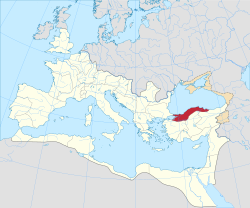Chalcedon
Χαλκηδών | |
|---|---|
Town | |
 The small Church of St Euphemia that serves as the Greek Orthodox cathedral of the Metropolitan Diocese | |
| Etymology: Carthage | |
 Bithynia as a province of the Roman Empire, 120 AD | |
| Coordinates: 40°59′04″N 29°01′38″E / 40.98444°N 29.02722°E | |
| Country | Bithynia |
Chalcedon (/ˈkælsɪˌdɒn, kælˈsiːdən/;[1] Ancient Greek: Χαλκηδών, romanized: Khalkēdṓn; sometimes transliterated as Khalqedon) was an ancient maritime town of Bithynia, in Asia Minor. It was located almost directly opposite Byzantium, south of Scutari (modern Üsküdar) and it is now a district of the city of Istanbul named Kadıköy. The name Chalcedon is a variant of Calchedon, found on all the coins of the town as well as in manuscripts of Herodotus's Histories, Xenophon's Hellenica, Arrian's Anabasis, and other works. Except for the Maiden's Tower, almost no above-ground vestiges of the ancient city survive in Kadıköy today; artifacts uncovered at Altıyol and other excavation sites are on display at the Istanbul Archaeological Museum.
The site of Chalcedon is located on a small peninsula on the north coast of the Sea of Marmara, near the mouth of the Bosphorus. A stream, called the Chalcis or Chalcedon in antiquity[2] and now known as the Kurbağalıdere (Turkish: stream with frogs), flows into Fenerbahçe Bay. There, Greek colonists from Megara in Attica founded the settlement of Chalcedon in 685 BC, some seventeen years before Byzantium.
The Greek name of the ancient town is from its Phoenician name qart-ħadaʃt, meaning "New Town", whence Karkhēd(ōn),[3] as similarly is the name of Carthage. The mineral chalcedony is named after the city.[4]
- ^ "Chalcedon". Dictionary.com Unabridged (Online). n.d. Retrieved 2008-09-21.
- ^ William Smith, LLD, ed. (1854). Dictionary of Greek and Roman Geography. "Chalcedon".
- ^ Harper, Douglas. "Chalcedony". Online Etymology Dictionary. Retrieved 2010-05-19.
- ^ Erika Zwierlein-Diehl: Antike Gemmen und ihr Nachleben. Berlin (Verlag Walter de Gruyter) 2007, S. 307 (online)
